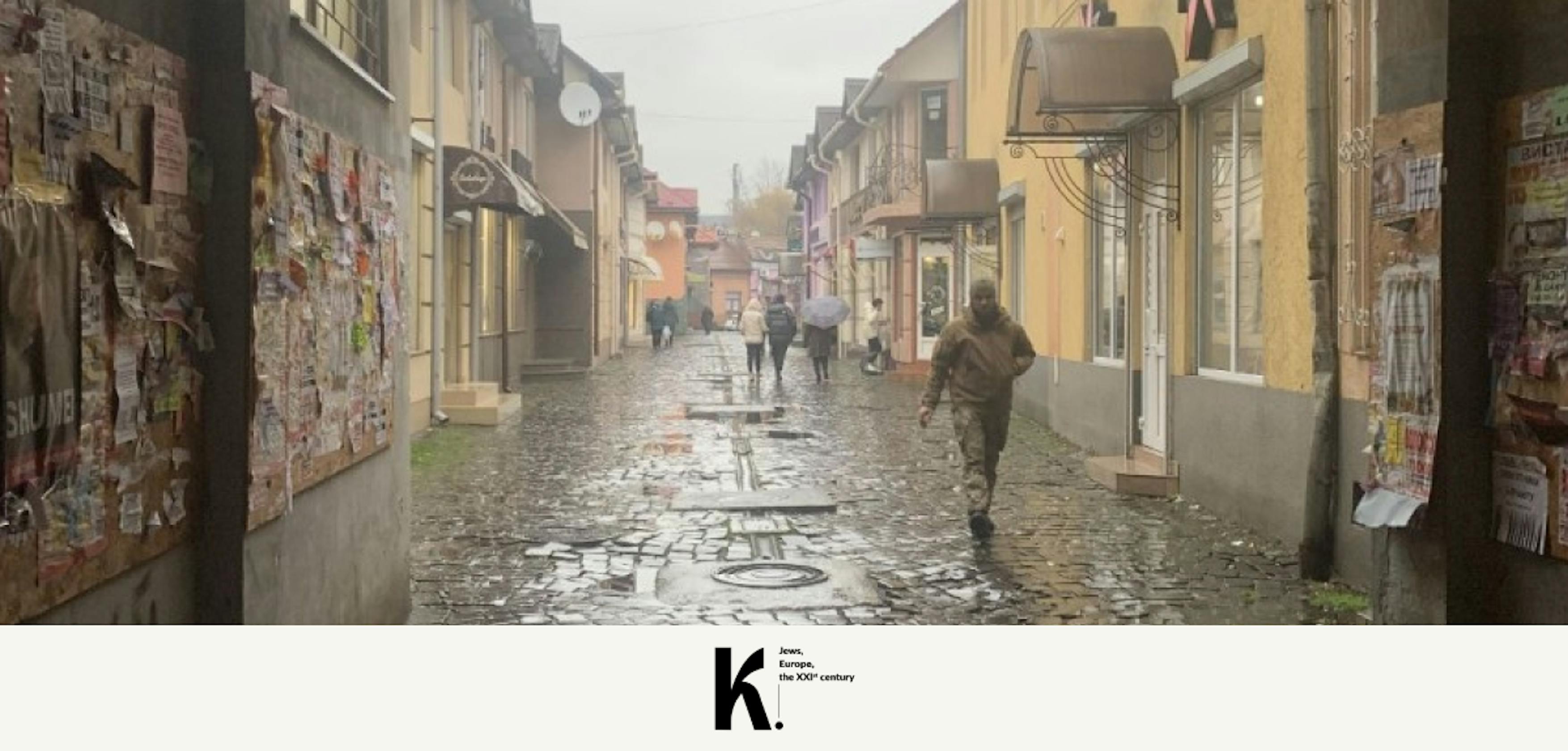
Published on K. Magazine
Rabbi of the Massorti community in France, Yeshaya Dalsace went to Ukraine to Munkács – Moukatchevo in Ukrainian – where only a hundred Jews remain. A rabbinical conversion commission was recently organized there for about fifteen people. The process, which began years ago, had been suspended by the war. A travelogue.
The route to Ukraine is through Budapest. In any case, you have to enter a neighbouring country and then continue by land. Budapest, which I have known for some twenty years, seems to me to be increasingly integrated into Europe, despite the ambiguities of Orban’s policies. During the Soviet era, the Hungarian capital was the centre of Jewish life in the Eastern bloc. It was home to the only rabbinical school in the entire Soviet hemisphere: the Neologue seminary (a branch of the Massorti or Conservative movement), a small remnant of the Jewish life that flourished before the Holocaust on the entire Eastern European continent. This once famous seminary was built, as were many seminaries around the world, on the model of the one founded in 1854 in Breslau (then in Germany) by Zecharia Frankel. After the war, the Budapest seminary trained the only rabbis in the communist bloc.
This extreme narrowness of Jewish life in Eastern Europe is over. Since the fall of the USSR, there has been an incredible and unexpected revival throughout the region, which has seen the arrival of all the Western Jewish organizations, especially the Lubavitch. Everywhere, the “Jews of silence” took up their voices. They went en masse to Israel in the 1990s, others emigrated to Germany or America, but some stayed behind. Young people returned to their roots and rediscovered themselves as Jews. At the time, there was no question of making a distinction between “Russian” and “Ukrainian”, all were in the same Soviet mold. Today, Jewish identities are shattered by the conflict: many Jews are leaving Russia, where the climate is unhealthy and where worrying anti-Semitic voices are being raised in Putin’s entourage, while on the Ukrainian side, many have fled the bombings. All those I met claim to be first and foremost Ukrainians. Putin has succeeded in creating a true Ukrainian identity among Jews who previously did not necessarily think of themselves as such, notably because of nationalist “heroes” such as Bogdan Chmelnitsky or Stepan Bandera, whose mere mention of their names evokes the worst nightmares in any Jew who is somewhat aware of history.
Five days after the start of the current war, I phoned Yevgeny in Israel, an old friend and fellow soldier in the IDF, who grew up in Kharkiv and served two years in the Red Army. I checked to see if he still has relatives in Kharkiv, then under Russian bombs, but his entire family, in the broadest sense, has long since emigrated. “Tell me Yevgeny, do you feel Ukrainian?” The answer is sharp, even shocking: “I am a Jew, the disputes between Russians and Ukrainians are none of my business. They have never stopped bullying me. To hell with them all! Three weeks later, his speech had completely changed, he wanted Ukraine to win, he wanted Putin to die and his daughter had gone to help the refugees at the Romanian border. Thanks to Putin, Yevgeny, a child of the Soviet Union and a happy Israeli (as much as a true Ashkenazi can be, so not too much) became Ukrainian.
But back to Budapest. Today, Hungary’s capital is an active Jewish centre, with functioning synagogues, kosher restaurants and many Jewish tourists, including Hasidim on pilgrimage to what was once their Carpathian stronghold. It is in the small haredi minyan (orthodox prayer group) that I meet my friend and colleague Shlomo, just arrived from Israel. The next morning, early in the morning, the train to Ukraine is waiting for him and me. A seven-hour journey to the East. In fact, what makes the journey much longer is the border crossing, the slow pace of the controls and, I believe, the adaptation of the train to the different gauge of the rails between Europe and Ukraine. I am struck by the number of women and children on this train. At the border crossing there are hardly any men left, except for elderly ones: those who go to Ukraine are mainly refugees on their way back or visiting. A bridge crosses a grey river, the blue and yellow flag appears. At the first station, a crowd of travellers descends. The police go up, check passports, all of them taken to an office by a soldier. She comes back and gives everyone their document. I politely slip her “spassiba”, one of the few Russian words I know. She smiles slightly, then turns around and says “in Ukrainian we say: dyakouyo”. This was my first contact with the hatred of Russian that Putin has managed to arouse and that I will come across again and again. In fact, all Ukrainians know Russian very well and more than half of them know it better than Ukrainian. But Russian, widely used around me during this stay, has become an enemy language, a default language… I try to remember this “dyakouyo” and each time, the effort to politely say this word in Ukrainian will be clearly appreciated by people who, as far as I can tell, exchange with each other mainly in Russian.
The train starts moving again and the cities I pass through take me back in time. The border between the Eastern European countries that have become members of the Union and those that have remained in the bosom of the big Moscow brother is technologically marked. In the past, crossing the Iron Curtain meant entering another world. After thirty years of integration into the Western camp, the cultural traces of the Iron Curtain are fading. The border between the two worlds has moved eastwards, but here it is still tangible. Going from the European bloc to the Russian bloc is clearly felt. If Ukraine wins its war of independence, this border will be pushed beyond the Dnieper.
On the station platform, the scenes of reunions are heartbreaking, we immediately understand that these people have not seen each other for months. One woman in particular arrives with her ten year old daughter, and a man, who I assume is a soldier, is waiting for them. They embrace and don’t let go of each other, hugging each other in turn, hesitating to interrupt this family embrace to set off. How many family dramas, worries, sufferings, forced separations are hidden behind so many kisses!
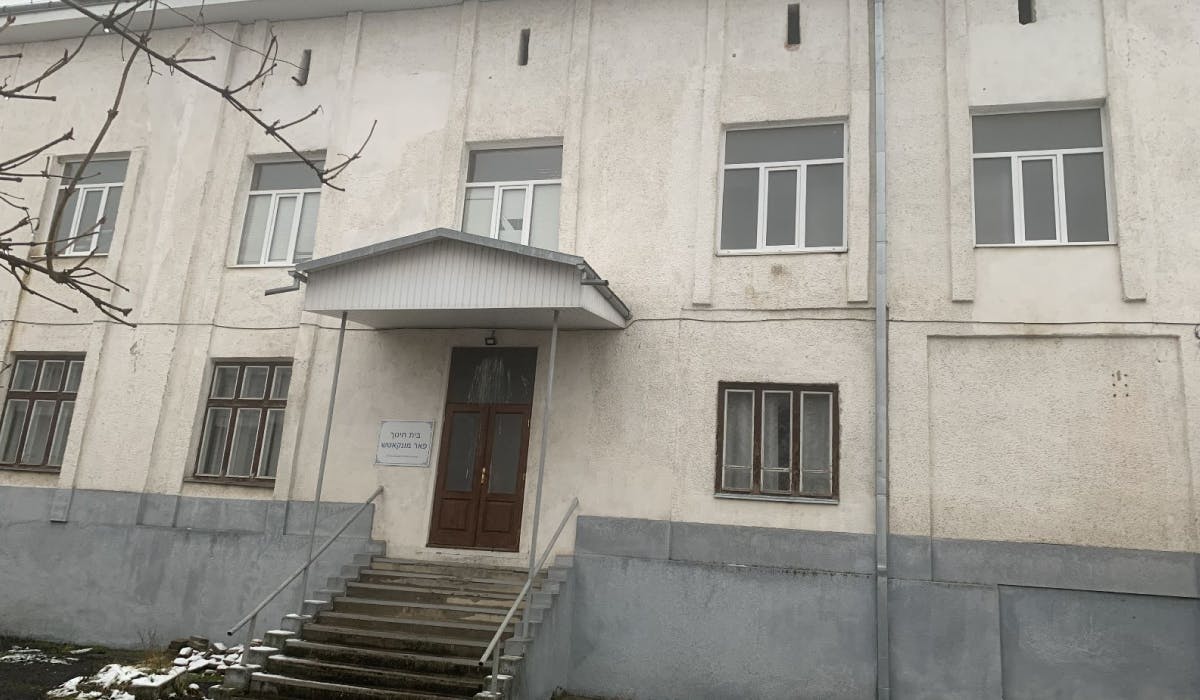
Former Beit Midrash, Munkács [Moukatchevo] © Yeshaya Dalsace
Night falls when we arrive at the hotel. The streets are dark, there is no public lighting, the noise of small generators placed on the pavements in front of some shops or cafés fills the city with a rather tiring background hum. Some shops have them, others do not. The cafés operate in this way and remain lit, thus becoming a rallying point for the population. People come and go in the dark or light up with small lamps or mobile phone lights. This gives the city a strange, almost ghostly atmosphere. We enter the hotel plunged in the dark, we guess silhouettes, the reception is lit with a torch, we hardly see the lady who welcomes us. We go upstairs by the light of our phones.
The electricity infrastructure is systematically bombed by the Russians. The country is nationally united in the various areas more or less affected and electricity is distributed in rotation from one area of the country to another. As soon as it is restored, about two hours every day, but never at the same time, you have to take advantage of it to recharge your phone, take a shower once the water is hot enough, rush to the toilet, contact your family by WhatsApp when the wifi is finally working, get news from the front on the internet. But beware, the conversation may suddenly stop in the middle of a sentence, the shower before you’ve had time to rinse off and so on. Faced with this adversity, the Ukrainians seem stoic and tinker. Car batteries are installed to power a pallid lighting system with low-energy bulbs. They grope around and gather around a small lamp. You don’t take off your down jacket, etc. I doubt that Putin will be able to break the morale of the brave Ukrainians in this way. He’s only widening the gap of hatred and resentment.
***
The purpose of my expedition is a Jewish gathering in Munkács organised by Reuven, a rabbi friend from Kiev who is currently a refugee in Israel. He has just arrived with his wife and their three daughters. I know them quite well because they have stayed with me in Paris. This little family is a great team. Reouven teaches, sings, comforts; Lena, his wife, animates and explains; and their daughters organise games. My family operates in the same way as the “family rabbinate” and I can relate to it. About fifty participants in this gathering come from all over: Kiev, Odessa, Czernowitz, Dnipro (a city close to the front) and even from Berlin and Warsaw where some have been refugees since the beginning of the conflict. Most of them have known each other for years. They have participated together in summer camps and other Jewish communal activities, but they have not seen each other for months because of the war and are happy to meet again. This is part of Reuven and Lena’s network, an open-minded, warm, friendly Jewish community that functions as best it can, despite distances and adversities.
Why Munkács? Because the town is close to the border, accessible, and in one of its hotels there is a kosher mikvah (ritual bath). Indeed, a certain Roth, a billionaire from Munkács, invested in a real estate complex there, including this hotel where he had a mikveh built. The city can thus receive Chassidim in complete peace of mind. The mikveh is of interest to us because we are organizing a Beit Din (rabbinical commission) for the conversion of some fifteen individuals whose process, which began years ago, was suspended by the war. Three rabbis will talk to the candidates and decide on each case. The stakes, decisive for the candidates, generate a rather special atmosphere, a mixture of tension and communion.
Munkács is a small, rather pretty provincial town. Before the Shoah, almost half of the town was Jewish, with a community of about 14,500 members. It is a place where one could change passports several times without moving. Once part of the Austro-Hungarian Empire, the city became part of Czechoslovakia in 1920. As in all of Eastern Europe, and especially in this region of Transcarpathia, the local Jewish population had all possible factions and sensibilities. There were Hasidim, progressives, Zionists, Bundists, etc. However, one rabbi particularly marked the place: Rabbi Ḥayim El’azar Shapira (1872-1937), the Admur of Munkács, whose fanatical closed-mindedness has remained legendary. In his eyes, the slightest innovation – first and foremost Zionism – was satanic. Today, the so-called Munkács Hasidut, one of the most rigid, still exists and can be found in Borough Park, Brooklyn, as well as in Jerusalem, where it forms a small, self-contained island in the Na’hlaot neighbourhood in the city centre. There is a famous black and white documentary film about the Jews of Munkács in 1933, which shows the rabbi exhorting in Yiddish the Jews of America to respect the Shabbat, Zionist children dancing and singing the Hatikva, a young Hassid negotiating a volume of the Talmud with a travelling bookseller, men and women mixed together… Excerpts from this film are permanently projected at the entrance of the Yad Vashem memorial exhibition to show the dynamism and diversity of the Jewish world before the genocide.
With the Munich Agreement of 1938, the city was annexed by Hungary. In 1944, with the German invasion, two ghettos were set up and the Jews were shipped in a few convoys to Birkenau, as part of the horrific deportation of Hungarian Jews orchestrated by Eichmann, which meant the extermination of more than 430,000 people in just two months. After the war, the Transcarpathian region became part of Soviet Ukraine and in Munkács – Mukatchevo in Ukrainian – a discreet Jewish life continued during the communist era despite the numerous persecutions.
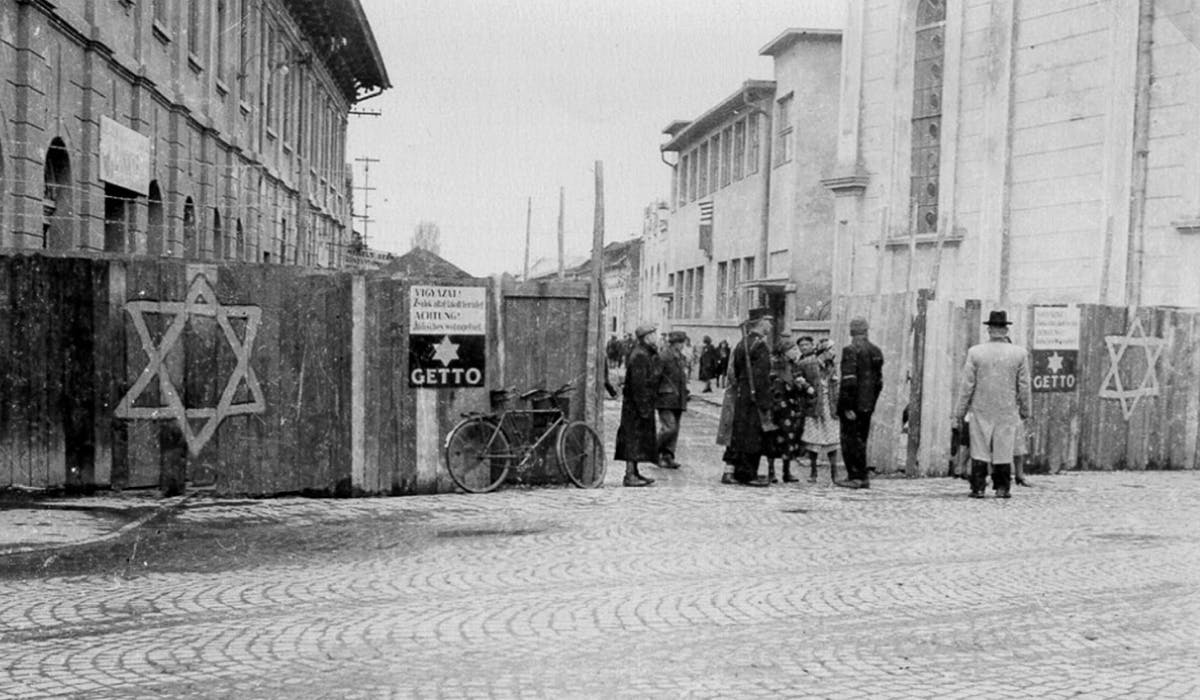
Munkács ghetto during the war © Yad Vashem
Today, there are hardly any Jews left, only a hundred or so, of whom a very small handful keep the synagogue running. The synagogue has recently been restored and it was there, with them, where I prayed every morning in a tiny office to avoid the cold of the main hall. They are led by Abraham Leibowitz, a charming man with an inimitably gentle Yiddishe punem (Jewish face). He has a son in Jerusalem, another in Kiev, and small children, but his heart beats for Munkács. His father, the only survivor of the Shoah in his family, checked his wife’s name on the German lists to make sure he was a widower and then found a new wife among the survivors: Abraham was the child of reconstruction. It is now an old man who presides over the modest Jewish destiny of Munkács. Our only common language is Yiddish, but given the level of my language and the accent of his, conversation is unfortunately limited! The communion of minds and the tenderness of the looks always work in these cases, beyond the linguistic obstacles. It is understandable that with the weight of history and the current situation, praying in the small synagogue with the last Jews of Munkács is not trivial, neither for us nor for them. Thanks to our group, there was a minyan in the synagogue, something that, apart from Kippur, had not happened for over a year.
Walking through a small town like Munkács is as poignant as it is revolting. You walk from street to street, you look at the houses, the shops, you know that thousands of Jews lived here, but nothing says so anymore. Who could even guess? No one does. There is no memorial, no inscription, no copper paving stone on the pavement. An entire section of the city was deported and exterminated in less than a month. The city was emptied, its heart and limbs cut out. As in all these Eastern European countries, there are few reminders of this not so distant past.
Today, the challenge is not even to rebuild, but to save the small remains that are still viable. Some distance from Munkács, in Slovakia, in Kosice, where I had the honour of officiating in a magnificent Art-Deco synagogue at the first public Jewish wedding since the Shoah, I remember a sign in the town centre in memory of the Hungarian Jews whose convoys had passed through this small industrial town, a regional railway hub. This modest monument shows the beginnings of an end to the policy of silence of the communist era. However, it says nothing about the 10,000 Jews of Kosice who were deported by the government of the very Catholic and very Slovak Father Tiso, a priest and at the same time a great fascist before the Lord, never disowned by His Holiness Pope Pius XII. Similarly, the huge building of the local philharmonic gives no indication to passers-by that it was originally a synagogue. To find oneself in these places is both fascinating and moving, but also unbearable because of these amnesiac reflexes and the disregard for the disappearance of a thousand-year-old Judaism.
***
Here we are, hoping that the electricity will come back on, when we meet in the dark to greet candidates for conversion in front of the Beit Din, listen to each one’s story, and organise a Mikveh in a hurry.
The candidates for conversion have been waiting for this moment for several years, after a long personal journey. As is often the case in these files, the journey is one of trial and error, of discovery, of learning, of slow integration into an active but reborn personal Jewish life. The portraits of our candidates are varied.
There is Ilona, whose father is Jewish and who has always felt Jewish, and her two daughters aged 13 and 3. The older one was born from a first relationship, the father has disappeared, and she wants to make her Bat-mitsva. They are from Kiev, but currently live as refugees in Berlin, the husband is in the army in Ukraine. A family shattered by war, whose Judaism is one of the threads that keep them going.
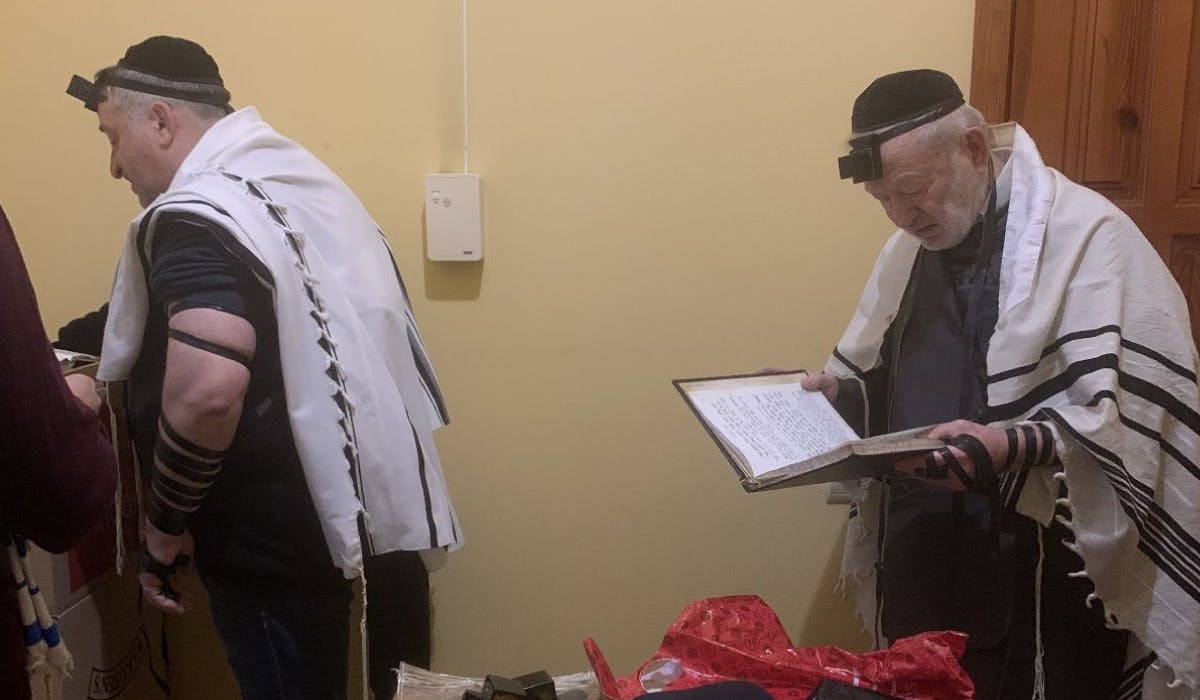
The last Jews of Munkács in prayer [Moukatchevo] © Yeshaya Dalsace
Nina, her two children and her husband come from Odessa. Her father is Jewish and she has been working for the Jewish Agency for many years, her approach is very cultural. The father of her son and daughter has left and does not look after them.
Her husband has made a liberal conversion, has been a member of the Lubavitch for years and is looking for a middle ground in the Massorti approach. He is eager to do some form of conversion/confirmation again. So is Kosta, in his thirties, single and with a somewhat similar background.
Pavel has a vague Jewish background, his wife is Jewish but had difficulties to prove it. She has gone to Israel where she has been converted with their daughter but he cannot join them as he is liable to be drafted. He stays here hoping for the end of the war and their return, unless he also makes Aliyah.
Norman is in a similar situation: his sister is married to a Jew and they are in Israel. Their parents are also in Israel and converted. As for him, he knows Israel well and lived there for a while. Like all the men in that country, he is stuck there because of the war and lives with his dog, under the bombings, waiting for better days.
Katerina is a businesswoman who owns several factories and has done a lot for the Kiev community. Like her namesake in Appelfeld’s novel, she is not Jewish but grew up among Jews and lives her life as a Jew, not a question for her. She currently lives in Berlin.
Dasha is married to an Israeli diplomat of Belarusian origin. She is currently in Berlin and works in the community.
Tatiana is of Jewish origin, she has family in Israel, she comes from Berlin with her 11 year old son David who attends a Jewish school.
The most curious case is the couple from Chernivtsi, already elderly and accompanied by their adult son. Their approach is strictly spiritual. They have no Jewish background; it was a passage through Protestantism that led them to Judaism. The whole family has been looking forward to this moment of entry into the Covenant of Israel for years.
There is also Vera, an elderly woman, who takes a similar step.
And finally there is the touching case of Kristina and her two children. They are assiduous in this Jewish life which they discovered thanks to the 13 year old boy who has been attending a Jewish school for years, which has a good reputation. Little by little, Judaism attracted them and they started to practice and attend the community. They feel Jewish and would like to be officially Jewish, but the father and husband – who did not come – is not interested. We are forced to refuse because of the family situation, as this would create a mixed marriage.
What is clear from each of these cases is the strong motivation to renew distended links with a Jewish background, but also sometimes the attraction that Judaism can have for people in search of spirituality. In this respect, Ukraine does not really differ from other countries. On the other hand, adherence to Judaism always involves human encounters, a warm community life, and does not seem to pose much of a problem in a country where antisemitism was so virulent. Today’s Ukraine is not the same as yesterday’s, everyone tells me. Anti-Semitism has been marginalised. The national hero, the one without whom Ukraine would probably not have been able to stand up to the Russian invasion, the one who dared to say to the West, “I don’t need a taxi, I need ammunition”, is that admirable little Jew who united the country in resistance to the oppressor.
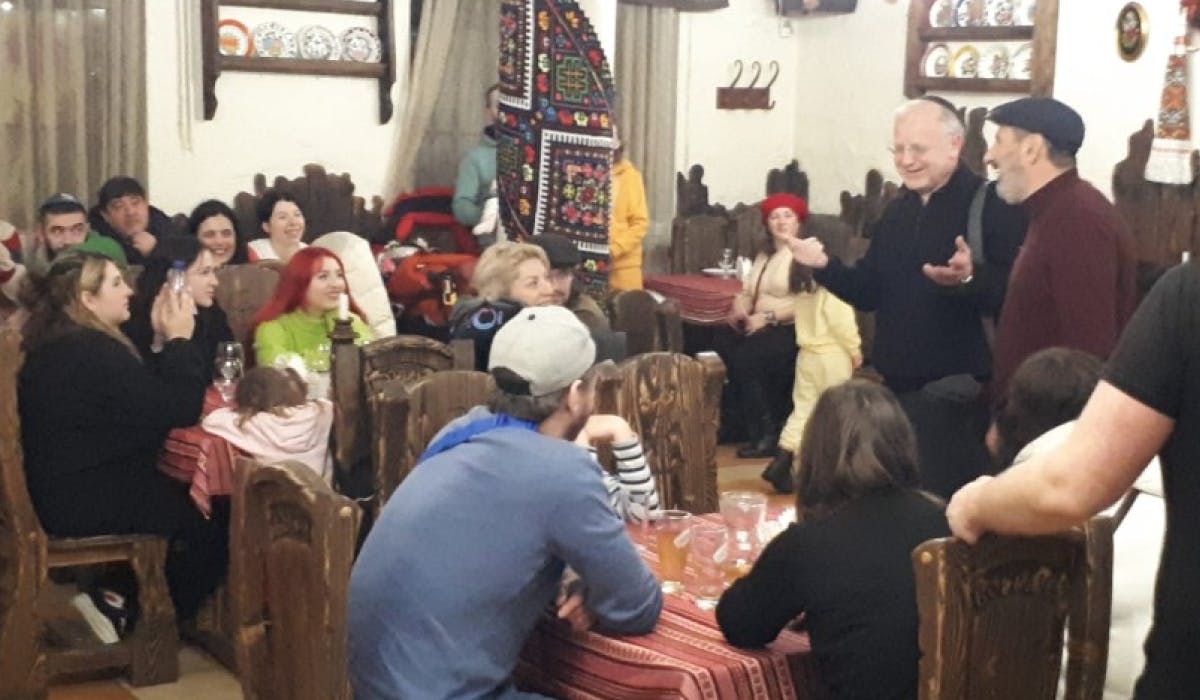
Last dinner in Munkács [Moukatchevo] © Yeshaya Dalsace
The current situation of the Jewish communities in Ukraine is weakened by the war and the migrations it generates. But we can feel how strong the fabric remains between communities, sometimes across borders.
For Shabbat, a large table brings together about fifty participants. The meals are cold, but the hearts are warm. At the Slavonic ceremony, everyone makes a toast, preceded by a short speech, and the emotion flows as much as the alcohol. When it’s my turn, I explain to what extent Ukraine is present in the media in France and that we are deeply committed to them. People tell me how important this solidarity from France is, how much Ukrainians need to feel that they are not alone. I also talk about the Jews of Ukraine, those of Munkács, about the importance and symbolic strength of being there together today. We cry, we laugh, words of Torah and toasts follow one another.
On Shabbat morning, the synagogue vibrates with the presence of this whole group. This is a bit of a challenge to the habits of the handful of local Jews who, it must be said, are not very happy people. The synagogue is Orthodox, so the women sit at the back, but we negotiate the opening of the opaque curtain for the visit of authentic Hassidim from Munkács on pilgrimage. Reading in the sefer Tora is an ordeal, the light is dim in this grey winter weather and no bulbs shine in the synagogue. At Minh’a, the evening prayer, it gets worse. But as soon as the prayer is over, suddenly: “Vayehi or!” (“Let there be light!”), everything lights up without warning. This sign from heaven made us all laugh.
As soon as Shabbat was over, a driver joined us to take Shlomo and me back to Budapest by road. An interminable journey with a 4 hour wait at the border! I leave with regret. The next day, two weddings will be celebrated among the freshly converted to Judaism. Abraham Leibowitz brought out the h’ouppa (bridal canopy), prepared a few years ago for the inauguration of the sefer Tora. But he has no recollection of an actual wedding between a ‘hatan and his kala in Munkács itself… This would be the first openly celebrated wedding since the Shoah! So a Jew should always have hope.
Receive the latest stories, updates and event notifications.

We are Masorti Olami, the official International Movement of Masorti/Conservative Judaism, based in Jerusalem, Israel.
Engage
Contact Us
Masorti Olami
32 General Pierre Koenig, 4th Floor
Jerusalem 93469, Israel
E: mail@masortiolami.org
T: +972 (2) 624-7106

